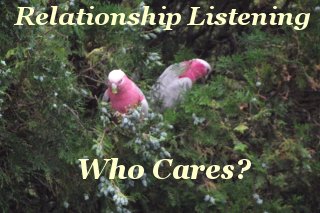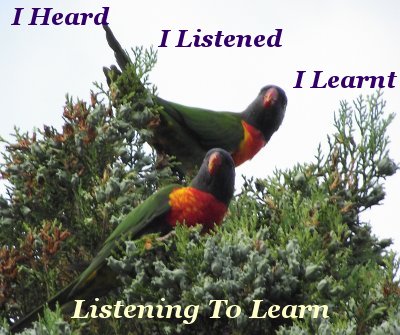The Various Types Of Listening
Part One
Part 1
Listening Requires Receptive Ears
Listening behavior is pivotal to how one navigates and succeeds to one's own satisfaction in life. Here we take a brief look at the various types of listening that constitutes one half of communication. Whilst each type is is closely related to the fundamentals of listening, and to each other, they all serve different purposes.
Covered here in three parts are insights into the main types of listening:

Communicating Is Difficult
Communicating is difficult because most Humans share a common habit of interpreting the World from their own viewpoint. This is not so unreasonable, considering the tremendous influence one’s upbringing and environment has on molding that viewpoint. In addition, most Societies insist its members conform to the Status Quo, rather than intelligently questioning a given state of affairs and seeking Truth.
Impediments
These powerful ever present influences, either consciously, or subconsciously, behave as deterrents to genuine communication. Blindly maintaining barriers that prevent Harmony and progress between individuals. In particular making changing one’s mind an onerous task that can take quite some effort. And courage.
However, there is much help at hand to enable each of us to improve our listening skills and become progressive Human Beings in our own right.
Suffering In Silence
Understanding and mastering the different types of listening is a major accomplishment in the direction of Personal, and wider, progress.

Familiarity with each type of listening allows one to approach any Human interaction with at least some confidence. And expectation of an amicable verbal exchange.
Listening, and communication, is far from a cut and dried process. It is messy, and often imprecise.
It is of little comfort to realize that - almost without exception – we Human Beings knowingly suffer, and yet accept, the malady of poor communication.
Nevertheless, If one consistently practice getting it right during individual encounters – fundamentally, by far the most important situation – it will flow on to getting it right in a group of three or more.
Contrary to popular perception, listening is all about asking questions. The right questions.
Asking pertinent questions, about the subject under discussion, that lead to
elucidation, and mutual understanding. Anything less is not
communication.
Willing Cooperation
Nature requires two willing Human Beings to communicate effectively, performing akin to employing willing cooperation. The process is initiated by you, or me, the individual. When both parties are prepared to listen, consistently, no matter how long it takes, there will be a meeting of minds as the aha moment explodes in vivid clarity, and the euphoric sensation of knowing we have been understood, never quite leaves us.
The various types of listening are our launching pad and stepping stones. They are tools and aids on our never ending quest to understand our fellows. Offering priceless contributions to creating a Good World.
Types Of Listening
In common with the fundamentals of listening, the different types of listening are all equal in importance. Perhaps though, with the caveat that effective listening should be our ultimate goal. For one profound reason. Effective listening embraces all listening types, and facilitates solutions to problems. Big or small.
Again, practice makes perfect. By mastering the familiar, on purpose, one encourages oneself to experiment and become adept with the less familiar.
Let’s begin with a listening type that challenges us incessantly . . .
Relationship listening
In the majority of relationships there are two prime, and immediate, concerns:
- The first is how much does the listener care about the speaker.
- The second is how much does the listener care about what the speaker cares about.
The closer the relationship the more important these two elements become. The deeper a listener cares, the stronger the bond the speaker feels.

Conversely, the less the listener cares, the further distant, and shallow, a relationship becomes. Recall that the listener calls the shots.
Empathetic listening executes an ascendant role in relationships. Depth of Empathy can be gauged by the speaker, from the listener’s body language, and tone of voice. More so than by anything the listener says.
Sound Relationship listening calls for rock solid support. To be there for another to share the highs of Life, and ameliorate the lows. Unconditionally accepting the person whether or not the subject matter is agreeable.
Habitually being “too busy” to listen to another Human Being is a relationship killer. So too is feeling entitled to ignore him or her.
Listening To Learn
Listening to learn is a key method Humans use to acquire knowledge and information. And to expand their Minds.
Whatever the context or situation, may be, when we listen, we have the opportunity to learn. The opposite is also true, refusal to listen can carry dire consequences.

Focus and concentration are central to learning by listening. This is easier when one is familiar with, and interested in, the topic matter under discussion.
Conversely one can get bogged down and lose track of what is being said, if one’s vocabulary does not match the subject. Or we simply lose focus. The demand on one’s concentration can be considerable, when listening to learn, over extended periods of time.
The capabilities to comprehend and retain new knowledge also play pivotal roles. These two capabilities normally manifest via the desire to know, and repetition.
Cool Guy
Jim Rohn, a wonderfully inspirational motivational speaker, was fond of saying that while his audience generally only heard his speech once, he got to hear it many times, enabling him to understand his own message better. Prescient Mind, Napoleon Hill, urged his readers to teach others what they comprehend, for the same reason. This author shares their sentiment.
We instinctively know how important repetition is, to remembering, and subsequent learning and understanding, and is an excellent reason to never be afraid to ask questions.
We can take advantage of our ability to learn by listening, wherever we may be and whoever we may be with. Knowledge is not a burden to carry.
Lack of knowledge though, can be a distinct disadvantage.
Once mastered, listening to learn is a powerful tool indeed, effortlessly alleviating the gloomy burden of not knowing.
Discriminative Listening
In another paradox of existence, even though one does not usually master discriminative listening without considerable experience, in effective communication, this type of listening comes into play first.
Discriminative listening enables one to use their Good judgment to evaluate:
- Mood
- Tone of voice
- Body language
And
- Attitude
of a speaker.
Recognizing and identifying obscure nuances, indiscernible to, and therefore unnoticed by the less attentive, goes to the crux of effective communication.
A discriminative listener is first and foremost a truth seeker, whose ability to discern exposes messages of a covert or cryptic nature, weeding out obfuscation and deceit.
Empathetic listening allows a
discriminative listener to judge without condemning. Time and patience
will always reveal the Truth.
Mindfully practicing the various types of listening helps us to be discriminative listeners.
Different Types Of Listening Rock!
Part 1
Next - Types Of Listening Part Two





